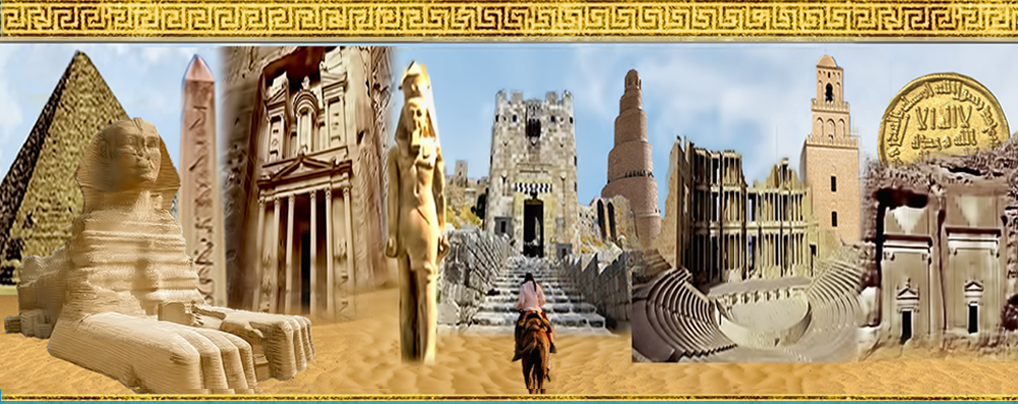Journal of the General Union of Arab Archaeologists

Abstract
العتب المنقوش الخاص بـ سشم نفر المكتشف حديثاً بسقارة [Ar]
يهدف البحث لدراسة عتب منحوت من الحجر الجيري ومكتشف حديثاً بجبانة جسر المدير، غرب هرم ونيس بوسط سقارة، حيث تم وصف العتب وترجمة نصه، بالوصف والترجمة تعليق يرتبط باسم المتوفى ولقبه وصيغة القربان حتب دي نسوت وصيغة برت خرو، كما تم استعراض الاسم الشخصي للمتوفى من حيث النطق والمعني وتاريخ ومكان ظهوره، ودراسة لقب المتوفى من حيث تأريخ ومكان ظهوره واستمراريته، مع أضافة التعليق على نعوت أنوبيس الأربعة الواردة على العتب، وسُجل الشكل الجديد على هذا العتب لكتابة اسم المتوفى، سشم نفر، مع استعراض بداية ظهور صيغة برت خرو نت، مع اقتراح نهاية الدولة القديمة كتأريخ لهذا العتب بناء على عدة ملامح، تتمثل في موقع الاكتشاف واللقى الأثرية بنفس بئر الاكتشاف والاسم الشخصي للمتوفى وطريقة كتابته ولقبه وصيغ القربان الجنائزية.
[En] This research is a study of a limestone lintel uncovered recently in Gisr El-Mudir cemetery, west of Unas’ Pyramid at central Saqqara. The lintel is described, and its text is translated. Then a commentary will be provided, focusing on the deceased's personal name, titles, together withand formulae. The deceased’s name is reviewed in terms of pronunciation, meaning, date, and place of appearance. The title of the deceased is studied in terms of the date and place of presence and continuity. The four epithets of Anubis mentioned on the lintel are commented on. A new form of writing the name of the deceased, Seshemnefer, is attested on the lintel. The appearance of is presented. Based on several features, the end of the Old Kingdom is suggested as the date for this lintel. These include the location of the discovery, other finds in the same shaft of the discovery, the personal name of the deceased and the way it is written, his title, and the funerary offering formulae.العتب المنقوش الخاص بـ سشم نفر المكتشف حديثاً بسقارة [Ar]
يهدف البحث لدراسة عتب منحوت من الحجر الجيري ومكتشف حديثاً بجبانة جسر المدير، غرب هرم ونيس بوسط سقارة، حيث تم وصف العتب وترجمة نصه، بالوصف والترجمة تعليق يرتبط باسم المتوفى ولقبه وصيغة القربان حتب دي نسوت وصيغة برت خرو، كما تم استعراض الاسم الشخصي للمتوفى من حيث النطق والمعني وتاريخ ومكان ظهوره، ودراسة لقب المتوفى من حيث تأريخ ومكان ظهوره واستمراريته، مع أضافة التعليق على نعوت أنوبيس الأربعة الواردة على العتب، وسُجل الشكل الجديد على هذا العتب لكتابة اسم المتوفى، سشم نفر، مع استعراض بداية ظهور صيغة برت خرو نت، مع اقتراح نهاية الدولة القديمة كتأريخ لهذا العتب بناء على عدة ملامح، تتمثل في موقع الاكتشاف واللقى الأثرية بنفس بئر الاكتشاف والاسم الشخصي للمتوفى وطريقة كتابته ولقبه وصيغ القربان الجنائزية.
[En] This research is a study of a limestone lintel uncovered recently in Gisr El-Mudir cemetery, west of Unas’ Pyramid at central Saqqara. The lintel is described, and its text is translated. Then a commentary will be provided, focusing on the deceased's personal name, titles, together withand formulae. The deceased’s name is reviewed in terms of pronunciation, meaning, date, and place of appearance. The title of the deceased is studied in terms of the date and place of presence and continuity. The four epithets of Anubis mentioned on the lintel are commented on. A new form of writing the name of the deceased, Seshemnefer, is attested on the lintel. The appearance of is presented. Based on several features, the end of the Old Kingdom is suggested as the date for this lintel. These include the location of the discovery, other finds in the same shaft of the discovery, the personal name of the deceased and the way it is written, his title, and the funerary offering formulae.
Recommended Citation
Soleiman, Saleh
(2024)
"THE INSCRIBED LINTEL OF SESHEMNEFER DISCOVERED RECENTLY AT SAQQARA,"
Journal of the General Union of Arab Archaeologists: Vol. 9:
Iss.
1, Article 3.
Available at:
https://digitalcommons.aaru.edu.jo/jguaa/vol9/iss1/3
Included in
Historic Preservation and Conservation Commons, History Commons, History of Art, Architecture, and Archaeology Commons

